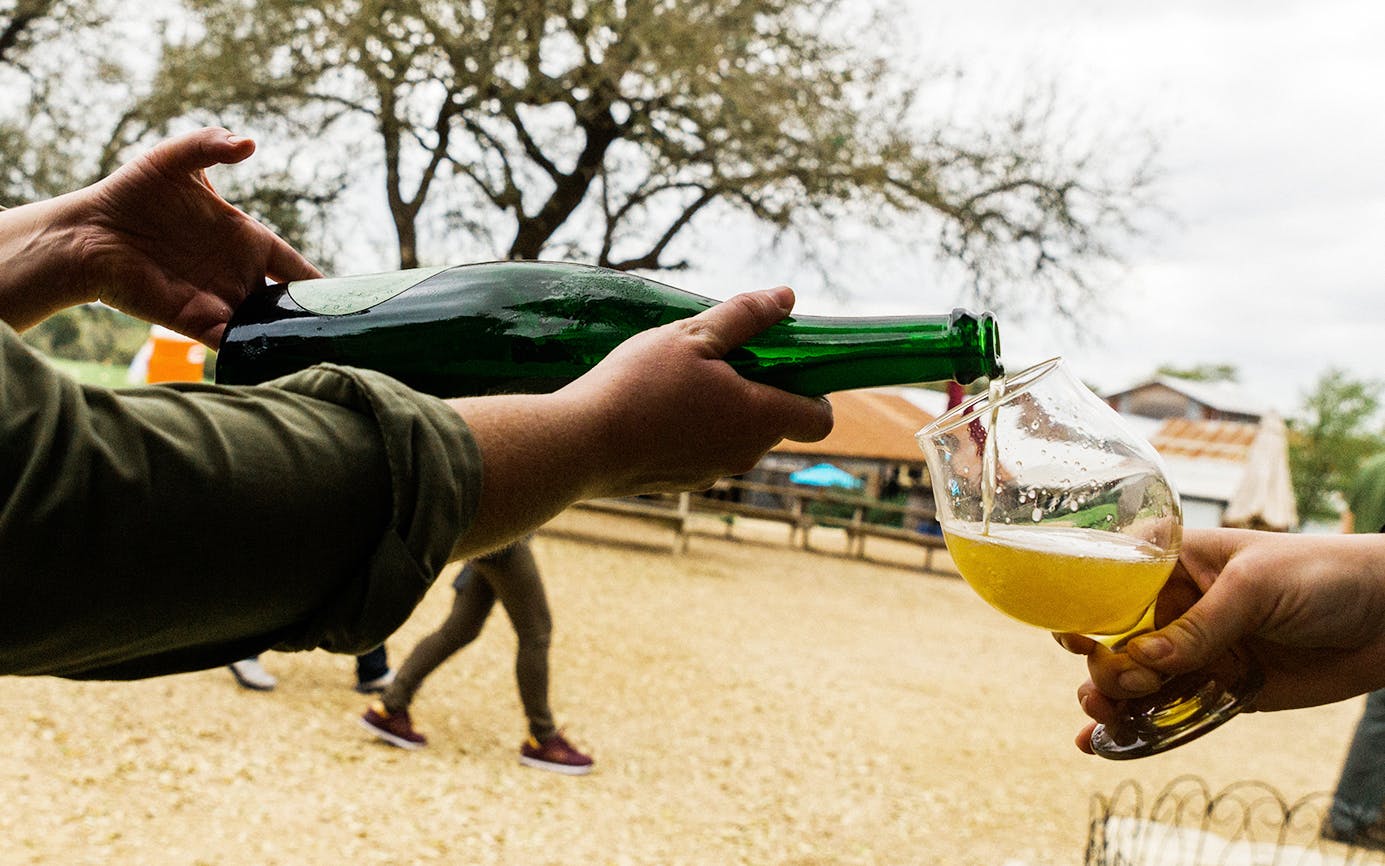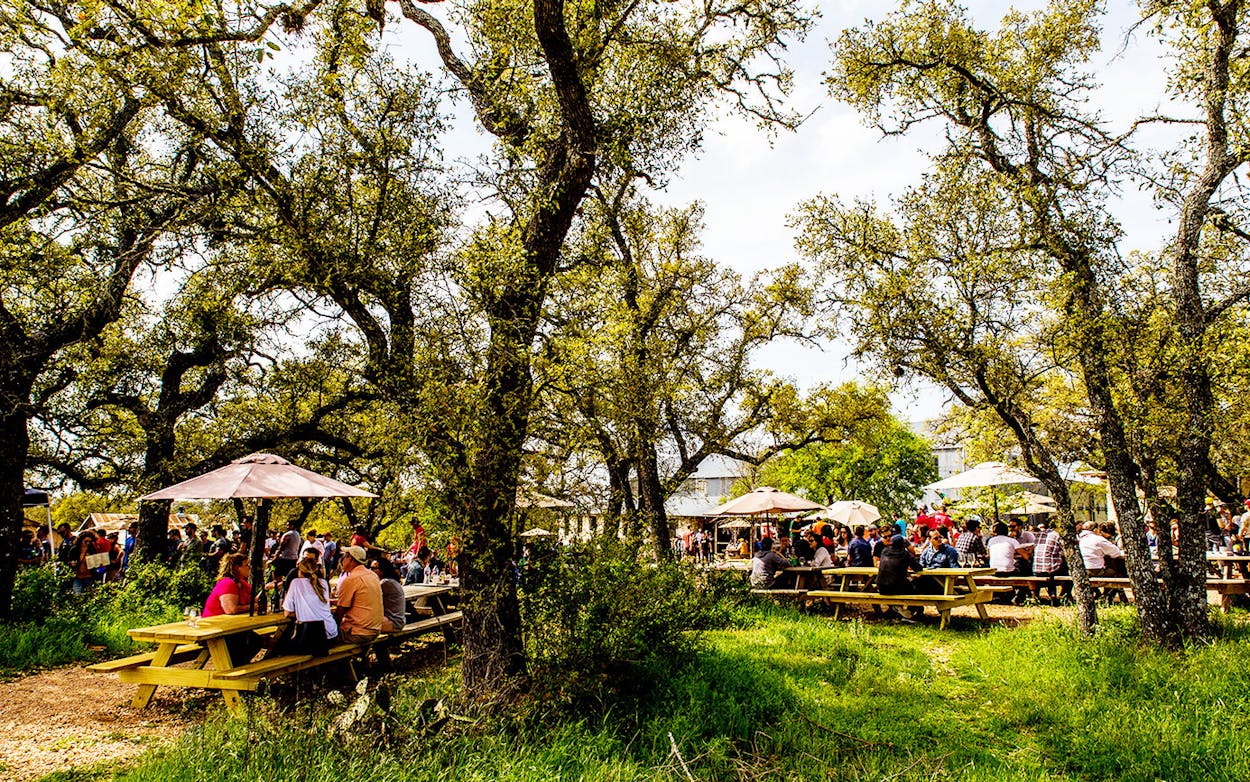Regan Meador wants to produce wine that tastes like his native Texas. At Fredericksburg’s Southold Farm + Cellar, he’s one of a small group of winemakers in the state who are committed to using 100-percent Texas-grown grapes and as little human intervention as possible.
“Natural wine” producers like Meador believe that the best vintages start in the vineyard. Their small batches are terroir-driven, drawing flavors and textures from the unique climate and land where the grapes were grown. “I believe that, until Texas wine stops attempting to emulate California and embrace making wine that is totally unique and reflective of Texas, that we’ll remain a tertiary wine-growing region,” he said.
It’s difficult to fully appreciate this philosophy without comparing it to conventional viticulture, which prioritizes yield, appearance, and taste. Pesticides and chemical fertilizers are typically used to maximize each grape harvest. Animal proteins are used to filter wines, and chemicals add color. Foreign yeast and sugars make the wine sweeter or balance out the natural acidity. Even smaller-scale conventional wineries that don’t manipulate wines to the same extent as mass producers still favor human control over natural production by using inoculated yeasts and added sulfites.
Natural wine producers, by contrast, employ organic viticulture practices and a winemaking process that neither adds nor removes anything in the cellar. That means no non-indigenous yeasts, no added sulfites, and certainly no chemicals. Additionally, there is no fining or tight filtration, which results in an almost cloudy appearance for many natural wines.

While it may seem like a set of strict rules, the core of the natural wine philosophy is to extract the purest possible expression of each grape. These makers still want their products to taste good, of course, which means they must possess extensive knowledge about the factors that affect a wine’s flavor, from the vineyard’s elevation to the number of months dedicated to aging.
Yet there are about as many opinions about how to define “natural” wine as there are grape varieties. Many in the industry question the value and quality of such minimal intervention wine. Since the resulting juice usually has a higher-than-normal volatile acidity, some even accuse wineries of passing off undrinkable errors as “natural.” Into this fray arrives a conference aimed at educating Texans about the theories behind this approach.
On May 18 and 19, Wild World Natural Wine Festival will take over Austin’s Jester King Brewery, bringing with it more than two hundred natural wines, ciders, beers, and meads. Jester King will serve its usual menu of food, while “wandering musicians” will provide some additional entertainment. The event is the brainchild of Byron Bates, a sommelier who co-owns New York-based natural wine importer Goatboy Selections. He’s been working with Jester King during the past few years as the brewery has expanded its wine program.
Texas wine drinkers still don’t have the kind of access to small-production bottles that can be found in places like California or New York, though that has been slowly changing in recent years. Bates identified Austin as a city with an appreciation for independent makers and the wide spectrum of flavor profiles they create. “The enthusiasm here is incredible, and the market is hungry for information that goes beyond myths or fashion,” he said.
Alice Feiring, a former Time columnist and author of the book Naked Wine: Letting Grapes Do What Comes Naturally, and New York-based wine consultant Lee Campbell collaborated on Wild World’s programming, which includes more than 50 producers. Representing Texas along with Meador are Ian Rosel of La Cruz de Comal Wines and Henry Crowson of Crowson Wines, who will pour alongside high-profile national winemakers like Chris Brockway of Broc Cellars, Joe Swick of Swick Wines, Tony Coturri of Coturri Winery, and Krista Scruggs of ZAFA Wines (who used Texas grapes in her most recent vintages).
Joining them are superstar international producers like Éric Texier, Brendan Tracey, Noel Tellez, and Beaujolais icon Jean Foillard, who will give a talk about the beginnings of the natural wine movement. Other panels and seminars will cover topics like the future of cannabis wine, the search for a true American cider style, and the role of natural wine in Texas—the land of TEXSOM, the renowned international wine conference and awards ceremony that takes place near Dallas each summer.
“Texas has been completely conservative about their wine, and that is partly because of the context of TEXSOM and the classical education they promote,” Feiring said. “Natural wine is outside of that norm.”
Bates, for one, welcomes natural wine skeptics to the discussion. “We want to hear experts talk and debate their craft, and we want to hear from naysayers to try to understand what it is they don’t like about what they just drank,” he said. “We want to dig deeper into the science of fermentation—the aesthetics and ethics of real beer and wine. There are plenty of festivals that are about celebrating … We’re setting up our panels from the perspective of our personal curiosity and thirst for knowledge.”
While more conventional wine events involve lots of tastings and master classes in a conference-like indoor setting, Wild World attendees will have a chance to tour Jester King’s farm, see the vineyard the brewery planted last year, and taste cellar beers made with wine. “In a way this is going back to a lot of the older natural wine festivals in France like ViniCircus, where there’s wine, there’s food, music, and theater,” Feiring said. “That is something groundbreaking, and I think it’s totally visionary. It’s not about power tasting. It’s about hanging out, enjoying, learning something, and doing a two-step.”






